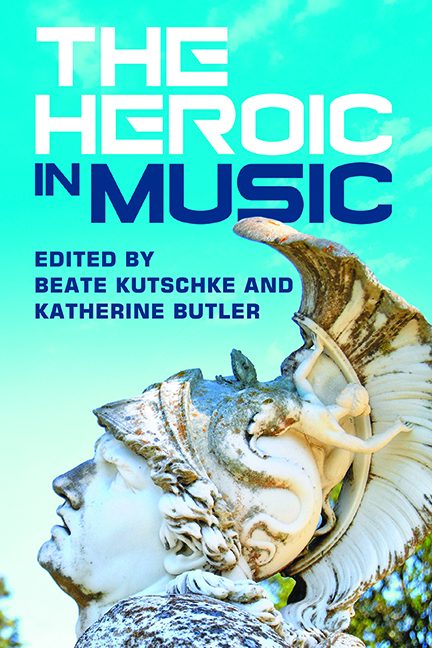Book contents
- Frontmatter
- Contents
- List of Illustrations
- Notes on Contributors
- Introduction
- Part I The Configuration of Heroic Music as a Tool for Shaping Moral and Political Identity
- Part II Music, its Ethics and Politics – Beyond ‘Beethoven Hero’
- Part III Heroic Music and its Moralities in Dictatorships and Post-Heroic Democracies
- Bibliography
- Index
Afterword
Published online by Cambridge University Press: 16 July 2022
- Frontmatter
- Contents
- List of Illustrations
- Notes on Contributors
- Introduction
- Part I The Configuration of Heroic Music as a Tool for Shaping Moral and Political Identity
- Part II Music, its Ethics and Politics – Beyond ‘Beethoven Hero’
- Part III Heroic Music and its Moralities in Dictatorships and Post-Heroic Democracies
- Bibliography
- Index
Summary
The Heroic…
…enjoys pride of place as a prevailing theme throughout the history of Western culture. As we peer back through thousands of years of that culture, we find Homer on the horizon, at the dawn of recorded literary history. From that horizon an imposing yet familiar figure strides toward us: the hero. Alfred North Whitehead once observed that the entire history of Western philosophy could be read as a series of footnotes to Plato. In the same vein, the history of heroism in the West is a series of variations on the Homeric heroes. The Iliad and Odyssey foreground several of the fundamental heroic types of Western culture: the battlefield hero (Achilles), the defender hero (Hector), and the wily and resourceful hero (Odysseus).
In Book IX of the Iliad, Achilles lays out the conditions of his heroism, as prophesied by his mother Thetis:
I carry two sorts of destiny toward the day of my death. Either, if I stay here and fight beside the city of the Trojans, my return home is gone, but my glory shall be everlasting; but if I return home to the beloved land of my fathers, the excellence of my glory is gone, but there will be a long life left for me, and my end in death will not come to me quickly.
He chose a short life and eternal glory. Hector, too, went willingly to his death for the sake of glory: when he realized that Achilles would cut him down in battle, he declared: ‘But now Fate overtakes me. Let me at least not die without a struggle, inglorious, but do some big thing first, that men to come shall know of it.’ Odysseus, on the other hand, always finds a way to prevail: what could be more impossible than being trapped in the cave of the monstrous Cyclops, having watched his companions be brutally murdered and eaten? And yet he gets out of the cave, with a combination of violence and trickery.
The heroes of ancient Greece were often the children of gods and thus by definition performed extraordinary deeds. Achilles is a demi-god, son of a sea nymph and grandson of a mountain nymph; he would have been immortal save for one small vulnerability.
- Type
- Chapter
- Information
- The Heroic in Music , pp. 237 - 244Publisher: Boydell & BrewerPrint publication year: 2022



